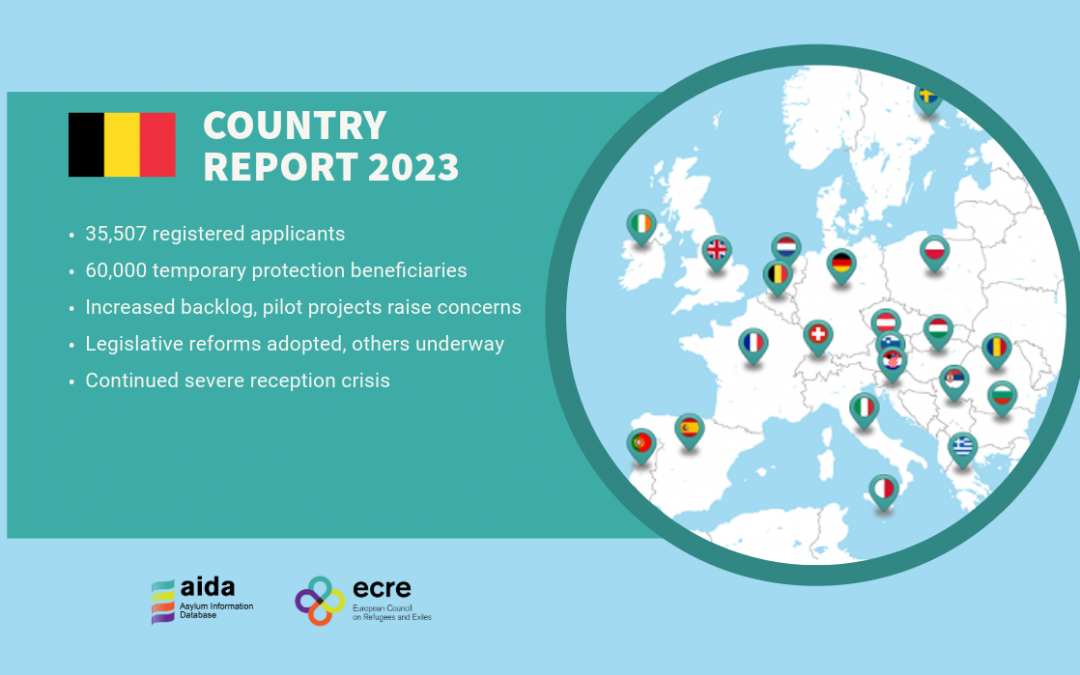The updated AIDA Country Report on Belgium provides a detailed overview of legislative and practice-related developments in asylum procedures, reception conditions, detention of asylum seekers and content of international protection in 2023. It also includes an annex which provides an overview of temporary protection (TP).
In 2023, 35,507 people registered applications for international protection in Belgium, down from 36,871 in 2022. The recognition rate remained at 43% (almost exclusively refugee statuses) when inadmissibility decisions are included. The overall in-merit recognition rate was 57.5% and reached 97% for Syrians and Eritreans, and 89% for Palestinians. However, only 41.4% of in-merit decisions concerning Afghans resulted in the granting of a form of protection.
77,636 people received a TP certificate in Belgium between March 2022 and December 2023. Since December 2023, the Immigration Office has faced capacity issues regarding TP registrations and decision-making. There is also a shortage of housing for both TP applicants and beneficiaries.
Although there has been an increase in staff and decision-making in the Office of the Commissioner General for Refugees and Stateless Persons (CGRS), the backlog has continued to increase. By the end of 2023, 31,998 people were awaiting a first instance decision. Between September 2023 and January 2024, the CGRS experimented with the ‘Tabula Rasa’ pilot project, which was aimed at maximising decision-making through the use of preliminary questionnaires that were sent to applicants in advance of their personal interview. However, a number of NGOs and lawyer associations voiced concerns about the pilot project due to the significant increase in the amount of work and responsibilities involved without an accompanying increase in resources. Separately, a “fast-track” pilot procedure was introduced in February 2024 for applicants from safe countries of origin and countries with a low recognition rate, for whom decisions should be taken within 50 working days. Due to a significant increase in appeals, there is a backlog before the Council of Alien Law Litigation for the first time in many years, and the average processing time has increased.
By February 2024, three of the four legislative proposals of the March 2023 “Migration Deal” had been adopted: a new procedure for stateless people, a limitation of the right to reception for rejected asylum seekers and changes to family reunification procedures. The proposal for a new voluntary return procedure remains blocked in parliament.
As a result of the reception crisis that started in mid-October 2021, access to the asylum procedure continued to be impacted in 2023. There were at least eight days during the year on which not all applicants were able to register on the day that they went to the registration centre.
The reception crisis has continued to significantly affect the right of applicants. Due to a shortage of places, single adult male applicants are almost systematically denied access to the reception network. Since summer 2023, the Federal Agency for the Reception of Asylum Seekers (Fedasil) no longer respects court injunctions to house single men, rendering their legal remedy ineffective. On 30 August 2023, the Secretary of State for Asylum and Migration, while acknowledging the illegality of this instruction, announced that Fedasil would no longer provide reception for single men. She later confirmed this following a condemnation by the Council of State. In practice, reception offers are limited to an absolute minimum (i.e. those with a vulnerable profile and those who have been on the waiting list for the longest). Applicants are forced to sleep rough and organisations have denounced the dire medical situation of some of them. Since the beginning of the reception crisis, legal proceedings have led to 8,812 convictions against Fedasil at the national level, and 2,086 interim measures against the Belgian state by the European Court of Human Rights.
The reception crisis has also affected the situation of beneficiaries of international protection. Applicants who receive protection without having accessed the reception network may not have an address, thus making the process of obtaining a residence permit very difficult. This, in turn, hinders their access to financial aid limits their ability to open a bank account or rent housing.
Family reunification also continues to be an issue for beneficiaries of international protection. Legal changes were made following the March 2023 Migration Deal, including a new right to stay in Belgium for the parents of minors who are in receipt of international protection, the introduction of the concept of “genuine care” as a prerequisite for family reunification as a parent of a Belgian child, and the expansion of cessation grounds for some categories of family reunification.
The full report is available here and the annex on temporary protection is available here.
For more information about the AIDA database or to read other AIDA reports, please visit the AIDA website.

